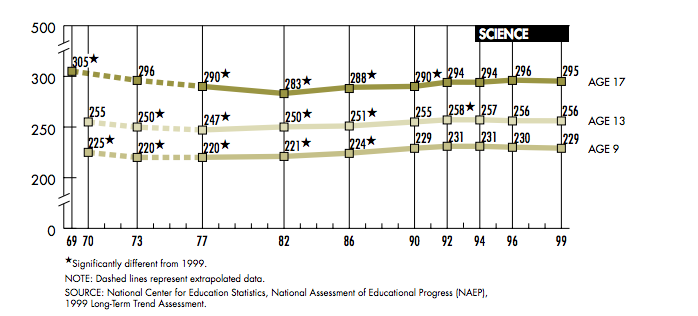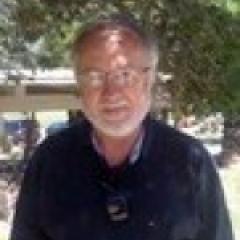We Teach Science Not Because It Nurtures the Child’s Imagination, but Because It Might Help Get a Job
Reform in science education for the past two decades is based on the ideas that American students receive an inferior education in mathematics and science, and as a result will not be able to compete for jobs in the global marketplace. In this scenario, the purpose for teaching math and science is to get a job. Standards-based reform coupled with high-stakes testing has created a model of education in which science achievement is the only worthy goal. According to these reformers if American students don’t do well in science (and math) they won’t be able to compete in the global economy. They won’t be able to get a job.
These same reformers use the international test results from TIMSS and PISA, but conveniently ignore the most reliable data, which is collected by the NAEP. As for the TIMSS and NAEP data, comparing one country to another is questionable, but if you want to compare students with similar academic backgrounds, then U.S. students score right near the top. As for whether American students are doing poorly in science, the data from NAEP shows that science (and math) scores have NOT been falling in U.S. schools. And the data shows that the achievement gap between white and black students is narrowing, but at the level that is not acceptable to many.
It is very convenient for some groups to make the claim that the U.S. is falling behind in math and science. But the evidence is that student learning in science, mathematics and reading has either improved or remained stable over the past thirty years, and during that time the achievements in science and technology have been breathtaking.
Even using faulty and questionable data, reformers, such as those at Achieve, continue to say over and over again that America does not have a first class education system, and in order to have one, then all students should be held accountable to same set of goals (standards) in science, math and reading/language arts. Hog wash.
Here’s the Thing
The child’s sense of wonder is stymied by a curriculum designed to test the science skills (read Standards) that experts think will lead to a competitive science-related job. The curriculum, based on authoritarian and arbitrary standards, actually becomes an obstruction to the child’s inquisitiveness and the teacher’s best pedagogical abilities and know-how. Rachel Carson, who most know because of her book Silent Spring, wrote other books, including A Sense of Wonder. Her remarks on a child’s sense of wonder is apropos today, as seen in this quote from her book:
A child’s world is fresh and new and beautiful, full of wonder and excitement. It is our misfortune that for most of us that clear-eyed vision, that true instinct for what is beautiful and awe-inspiring, is dimmed and even lost before we reach adulthood.
For example, in the field of science teacher education, most of my colleagues have developed inquiry and constructivist teacher preparation programs over the past two decades. The graduates of these science education programs not only understand the content of science, but also understand the nature of science teaching from the framework of leaning theory steeped in inquiry and constructivist learning. The child’s sense of wonder is at the forefront in these programs.
However, even with teacher education programs that are field- and inquiry-based, as most are, graduates face a wall of resistance when they begin their career. Wonder and inquiry are left in the stock room, and replaced with a compendium of standards to be transferred to students in preparation for high-stakes tests. If it’s on the test, then it fits the curriculum.
You already know that the Next Generation Science Standards‘ revised draft edition will be released this fall by Achieve. We concede that Achieve is the voice of authority for the math, reading/language arts and science standards in American education. Commissioned years ago by the National Governors Association to write standards in math and reading, Achieve has spread its standards over K-12 education landscape, with kudzu strength. It has virtually no accountability, yet this organization sets the goals for K-12 schools, and by 2014 most of the states will adopt computerized assessments to measure the standards. Schools are held accountable but not the policy makers lurking behind organizations that are pushing this top down take over of schooling.
There will be almost no room for teaching students how use their imaginations and sense of wonder in any of their science courses, K-12. Although it is difficult to snuff the imagination and curiosity of early elementary students, it seems as if we’re heading on a path that will be successful in this attempt. The fact is, the more science courses that students take, the less they like science. How will it be possible to turn around a trend like this when American science education is based on an arbitrary list of standards that are being developed without any context for student learning?
American mathematics and teachers are by nature inventive, and readily solve problems in their classrooms every day. If anything is in teachers’ ways of continuing creative and innovative teaching, it is rules imposed by NCLB on our schools. The requirements lessen the opportunity for learning. On this blog, we have cited peer-reviewed research that indicates that the high-stakes testing, and authoritarian standards impedes learning, and prevents teachers from doing what they are prepared to do, and that is help students uncover their love of mathematics and science.
Major organizations, including the Carnegie Foundation, the Gates Foundation, and the U.S. Department of Education, have provided resources (financial and intellectual) to support the work of Achieve. Using assessments completed by the Thomas B. Fordham Institute, a conservative tank of bureaucrats, Achieve boasts of its research-based work. Truth be told: none of the published research, which you can find on Fordham’s website, is not the result of the peer-review process, the accepted standard in the research community. All the research reported on the Fordham Institute site is in-house work, lacking the scrutiny that research work should be held to.
Standards-based and high-stakes testing does not promote creative or imaginative learning. What place would imaginative teaching and learning have in a system that promotes academic scores on a multiple choice examination, that soon will be totally computerized? None. We have put into place a system that will encourage rote learning, and traditional or conservative pedagogy. We have entered an age of authoritarianism in which the curriculum of American schools is dictated by organizations that have little to no accountability. Education goals have become market-driven even in an age when the research does not support any of the contentions made by the authoritarians. Unfortunately, American political parties show no differences in their attitude toward, or program recommendations for teaching, learning, and teacher education.
Henry Giroux puts it into context and indicts both major political parties:
Both parties support educational reforms that increase conceptual illiteracy. Critical learning is now reduced to mastering test-taking, memorizing facts, and learning how not to question knowledge and authority. This type of rote pedagogy, as Zygmunt Bauman points out, is “the most effective prescription for grinding communication to a halt and for [robbing] it of the presumption and expectation of meaningfulness and sense.” (Zygmunt Bauman,”Does ‘Democracy’ Still Mean Anything? (And in Case It Does, What Is It?)” [i]Truthout [/i](January 21, 2011). Online: http://truth-out.org/index.php?option=com_k2&;view=item&id=73:does-democracy-still-mean-anything-and-in-case-it-does-what-is-it).
Encouraging a Sense of Wonder
Inquiry science teaching by its very nature is a humanistic quest. It puts at the center of learning not only the students, but also how science relates to their lived experiences, and issues and concepts that connect to their lives. Doing science in the classroom that is inquiry-based relies on teachers and administrators who are willing to confront the current trend that advocates a standards-based and high stakes testing paradigm. The dominant reason for teaching science is embedded in an “economic” argument that is rooted in the nation’s perception of how it compares to other nations in science, technology, and engineering. This led to the development of new science curricula, but it also led the wide scale use of student achievement scores in measuring learning. Student achievement, as measured on “bubble tests,” has become the method to measure effectiveness of school systems, schools, and teachers, not to mention the students.
There is a disconnect between the standards approach, and the implementation of an inquiry-based approach to science teaching. We need to pull back on the drive to create a single set of standards and complementary set of assessments, and move instead toward a system of education that is rooted locally, and driven by professional teachers who view learning as more personalized, and in accord with democratic principles, constructivist and inquiry learning, and cultural principles that relate the curriculum to the nature of and needs of the students.
To sum this post up, here is a quote from Kareen Borders, a high school science teacher who received a Presidential Award for Excellence in Mathematics and Science Teaching, 2011:
My students are not passive learners of science, they ARE scientists. They embrace the idea that they are empowered to own their learning. In addition to creating a love of learning within my students, I am intentional about equipping students with wonder, teamwork strategies, and problem-solving skills for jobs that may not exist yet.
I think Kareen speaks for most of the science education community.
What do you think? Are we emphasizing achievement at the expense of other and perhaps more important goals of teaching?
This blog post has been shared by permission from the author.
Readers wishing to comment on the content are encouraged to do so via the link to the original post.
Find the original post here:
The views expressed by the blogger are not necessarily those of NEPC.

